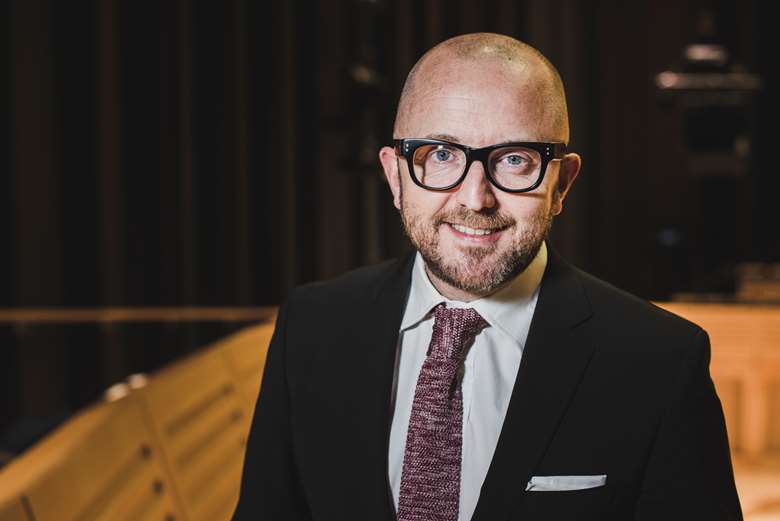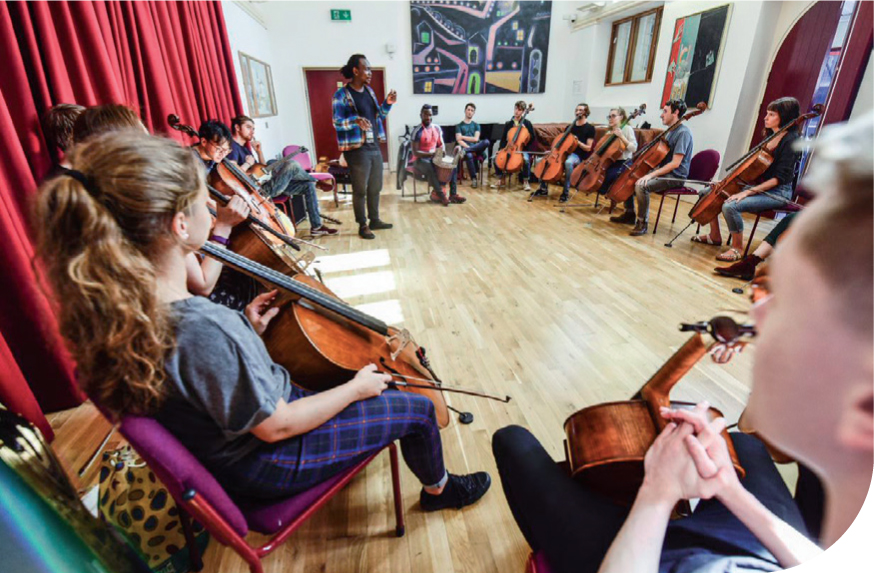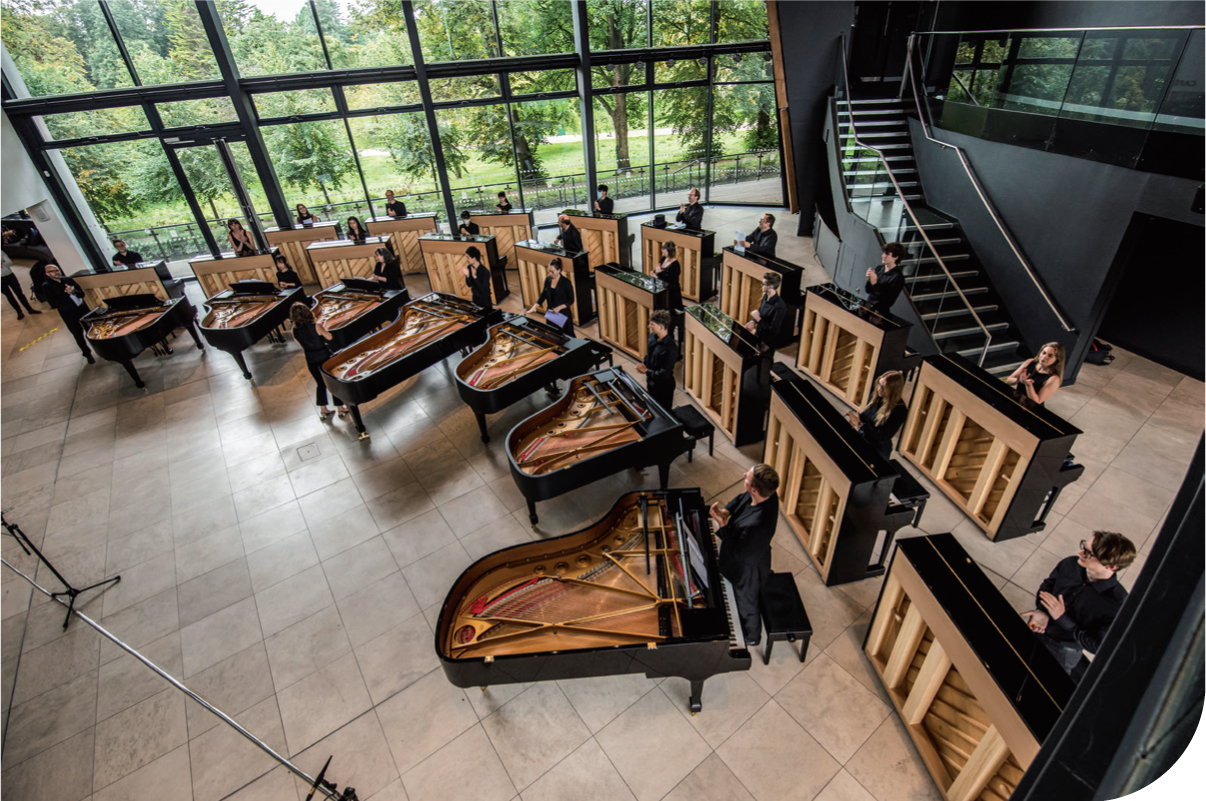Paving the way: RWCMD's BMus
Claire Jackson
Thursday, July 1, 2021
The BMus at Royal Welsh College of Music & Drama has had a transformative facelift for 2022 entry, courtesy of course leader Andrea Jones and recently appointed director of music Tim Rhys-Evans. Claire Jackson meets the latter for a sneak preview

Kirsten Mcternan
Tim Rhys-Evans has had a busy year. Having joined Royal Welsh College of Music & Drama (RWCMD) as its new director of music last April – two weeks into lockdown – the singer was tasked with overhauling the institution's popular BMus (Hons) course. The degree has just received official validation and Rhys-Evans couldn't be happier. ‘Rewriting it has been an enormous undertaking,’ he smiles. ‘We've been consulting with staff and students – and our industry partners – at every stage.’ Around 120 students will be admitted into the 2022 cohort, where the course will have a closer focus on real-life musicianship as well as digital skills. ‘There has previously been a subtext that everyone in a conservatoire was training to be a soloist, and, if you fell off the treadmill, you'd do something else,’ says Rhys-Evans. ‘Clearly there are many career possibilities besides being a soloist; we want to give community music making, teaching and all the other aspects of music equal billing with solo performance.’
Rhys-Evans is well placed to provide an on-the-ground perspective: in 2000 he founded choral group Only Men Aloud and led them to victory in BBC's 2008 competition Last Choir Standing. He later set up the Aloud Charity, which runs Only Boys Aloud and Only Kids Aloud, promoting the Welsh choral tradition and supporting young musicians. Rhys-Evans is also a renowned conductor (working with the National Youth Choir of Wales) and opera specialist (music director of both Welsh National Youth Opera and Youth Opera Northern Ireland, and has also served as the associate chorus master for Welsh National Opera). As an MA graduate and former vocal studies tutor, Rhys-Evans brought his own conservatoire experience to bear on the course rewrite.
‘I had to learn on the job,’ he says, reflecting on his preparation for the world of work as a 21st-century portfolio musician. ‘I wish there had been more in my own education to help me understand what was ahead.’ Born in New Tredegar, South Wales, Rhys-Evans began playing the piano at five. As a teenager, he joined Mid-Glamorgan Youth Choir before studying music at Cardiff University, followed by a Masters degree in performance at RWCMD. ‘I come from an ex-mining community where higher education opportunities were rare,’ he explains, ‘It's a major passion of mine to make sure that there is a pathway into the conservatoire for people from all types of background.’
 © RWCMD
© RWCMD
Manchester Collective workshop at RWCMD
Embracing digital
There are three main elements to the new BMus: musical language and technique; ensemble and collaborative artistry; and the musician in society. Rhys-Evans shows me a diagram of these themes depicted within interlocking circles, indicating that each has equal weight and all are connected. By ‘shows me’, I mean shares an image on screen: we are talking via Zoom, of course, as is now customary. Before the pandemic, like most people, only a small percentage of my own meetings took place online. Activities at RWCMD were, as you would expect, nearly always delivered in person. Transactions have had to evolve quickly, and rewriting the course has allowed Rhys-Evans to ensure that future students are well prepared for remote music making.
‘We've sharpened our digital strategy,’ he explains. ‘It's something I think that many of us have been thinking about on a personal development basis for some time. Obviously the pandemic has forced rapid up-skilling. The digital side of music has traditionally been associated with music technology or composing. Recent events have helped us to review that position. Students have to be able to film and edit, and undertake a variety of tasks.’
Future ways of working remain in flux, as many businesses adopt a permanent ‘work from home’ set-up in the face of ever-changing government policy. While we hope that the worst is behind us, it's important that students are well prepared for different work and study environments – and that their skills (often of a higher quality than many of the teaching staff) are formally recognised. Adaptability is key, and the new degree seeks to prepare musicians for the realities of life in an increasingly precarious industry. (The latest survey by the Incorporated Society of Musicians reveals the devastating impact the Brexit trade deal has had on the sector, with 79 per cent of businesses admitting they were ‘concerned’ or ‘very concerned’ about the future of their business over the next 12 to 24 months.) Rhys-Evans is aware that this preparation may be daunting for some students, many of whom will be experiencing the ‘little fish in a big pond’ feeling in their first year.
‘The format of the degree is like a hairpin,’ he says, ‘When students arrive, they go through an induction that helps them explore who they are as artists and people. Gradually, over the second year, the idea is they find new opportunities both with direction from the staff and on their own. By the third year they mould their own journey. There's greater flexibility with one-to-one provision in the last years to allow for specialisation.’ The importance of a musician's wellbeing is highlighted throughout the course, with mental health a priority. This is something that Rhys-Evans feels passionately about, having contributed to the BBC documentary series All in the Mind, which won a BAFTA Cymru Award for Best Documentary.
Collaborative approach
The new BMus also makes the most of RWCMD's enviable industry connections. Rhys-Evans describes Cardiff as ‘a big village’ and has worked with the conservatoire to build on historic collaboration. The institution has partnerships with the Welsh National Opera and the BBC National Orchestra of Wales (BBC NOW), as well as community groups and music services. (BBC NOW runs an online mentoring scheme for RWCMD musicians and members of the National Youth Orchestra of Wales; there are some great videos under #BBCNOWMentors). There is an expectation that students will immerse themselves in real-life settings from their first year, such as working with visiting chamber ensembles and interacting with schools. Rhys-Evans also intends to build on the existing relationship between RWCMD and the Aloud charity, of which he is now a patron. (He is also a vice president of the homeless charity Shelter Cymru and a trustee of The Darkley Trust, working with the arts and homeless charities within Wales. In 2013 he was awarded an MBE for services to music and for charitable services.)
The revitalised qualification encourages students to work with each other: ‘Collaboration happens already, of course, and these projects are often those that students are most proud of,’ says Rhys-Evans. ‘We wanted to bring this work into the assessment calendar. It was also a way to address the hierarchical system that sometimes exists in classical music where the soloist is at the top and everyone else is below. Being a collaborative musician requires just as much musicianship.’
 © Kirsten Mcternan
© Kirsten Mcternan
24 Steinways were delivered to the College last Sept, making it the first ‘Steinway Exclusive Conservatoire’ in Europe
Not every institution could offer such a ground-breaking course, but RWCMD has long demonstrated that it is not afraid of change. The conservatoire has undergone intense development over the past decades, receiving its royal title in 2002, as part of the Jubilee commemorations. The site itself has also improved, with two new performance venues (Richard Burton Theatre and Dora Stoutzker Hall), a new front of house area and rehearsal studios added in 2011. RWCMD was the first of the five conservatoires to receive an ‘All-Steinway’ status – meaning that the College has a significant fleet of the premier pianos: 62 brand-new instruments were delivered in 2009, including 19 grand pianos and a model D concert grand. Another 24 were delivered in 2020 so that now every acoustic piano at RWCMD is a Steinway, making it Europe's first ‘Steinway Exclusive Conservatoire’.
‘We'll be bringing in further changes in 2023,’ reveals Rhys-Evans, ‘It's about keeping relevant to the industry.’ These amendments involve integrating music technology more deeply into teaching and ensuring that jazz is on an equal footing with classical. The three core elements – artistry, collaboration and society – will remain at the heart of the course. ‘I believe so passionately in this qualification,’ concludes Rhys-Evans, ‘It sounds cheesy but teaching music is one of the most important jobs there is.’ A sentiment shared by all here at MT.

